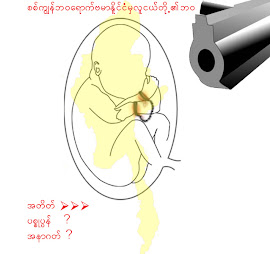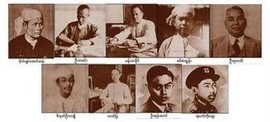

By SHIBLY NABHAN
Special to The Japan Times
It was far from a perfect crime and far from a perfect coverup: a shooting in broad daylight, hundreds of witnesses, scores of video cameras recording the crime from many angles, audio recordings of the shots fired, clear photos of a man brandishing a murder weapon, an insignia identifying the suspect's place of work, and an autopsy analysis of a body with clear gunshot wounds.
Do we have an arrest and prosecution? No. We have a one-page fax that doesn't give the name of a suspect, and doesn't even recognize that a crime was committed. This is the blind and mute world of Japan-Myanmar diplomacy.
Myanmar Deputy Foreign Minister Maung Myint recently sent a three-sentence letter to the Japanese Ministry of Foreign Affairs (MOFA), addressed to the family of Kenji Nagai, the journalist whose murder in Yangon had been telecast around the world. The scene of him on the ground with a mortal wound, still trying to film while a military goon faced him with a rifle, is not easy to forget. For me it may be impossible because I once met Nagai and was impressed by his journalistic dedication and courage.
The letter, released to the press by Nagai's colleagues, failed to even acknowledge that Nagai was shot. Reading it, you would think that Nagai suddenly died of a heart attack or stroke while visiting a peaceful and protest-free Myanmar. The letter used intransitive verbs rather than attaching any cause or origin to the death. Maung Myint's letter expresses "Heartfelt condolences" for Nagai "who lost his life unfortunately while in Myanmar." He termed Nagai's death "regrettable."
The words do little to ease the pain or solve the crime. Considering that the autopsy confirmed rather obvious gunshot wounds, perhaps Nagai's death could more accurately be called something like "murder."
Myint may have made this vicious tragedy even worse with evasive euphemisms like "I humbly share your grievances as you lost your son unexpectedly." When a military regime sends troops to open fire on demonstrators and visiting reporters, it should hardly be "unexpected" that people will die.
This episode exemplifies the paucity of concern that Japan has elicited from Myanmar's junta. Human rights groups, journalists' associations, and Burmese democracy organizations based in Japan were looking to MOFA to take up the gauntlet, but after a fact-finding mission and weeks of negotiations, the ministry has little more to show for its efforts than the one-page letter. MOFA needs to rethink its strategy and get serious by exerting strong and sustained pressure.
At a recent symposium in Tokyo, the director of Nagai's APF News Agency, Toru Yamaji, proposed bringing war-crime charges against the Myanmar regime at the International Criminal Court in The Hague.
A longtime friend of Nagai, Yamaji showed a stony expression until the faxed letter was mentioned; then he turned indignant. Holding up the blotched copy to the audience, he said: "We don't need this paper. We want (the Myanmar government) to investigate what happened."
Yamaji also demanded the return of Nagai's main video camera with its film, as well as the pages torn out of Nagai's reporting diary.
Nagai was not the only one killed in the recent crackdown — in fact we may never know the number of killings and imprisonments. Nor was he the only journalist to have a bullet rip through his body this year. Regimes like Myanmar's make being a journalist one of the world's most dangerous professions. The group Reporters sans (without) Frontiers lists more than 50 journalists murdered last year.
As one of Myanmar's biggest benefactors in cash, construction projects and road-building vehicles, Japan can bring considerable pressure to bear on the Myanmar junta. But rather than turning up the volume of its protest, MOFA seems to speak through a paper cup.
It is baffling that countries like the United States and China can negotiate the return of errant spy planes and their crews, but the Japanese government cannot get back a video camera, written notes and the name of the main suspect.
Myanmar would like to hide the gunman behind an olive-green curtain of military secrecy, but he is far from an anonymous soldier. Even a child could single him out from the other soldiers. I have studied uncountable video clips of the shooting; the soldier's face is visible — as are his feet.
All of the other soldiers are wearing heavy boots, but the one attacking Nagai is in sandals. This "sandal soldier" has a shoulder insignia on his uniform that experts believe is of the 66th light division based in Bagu (or Pegu), 100 km northeast of Yangon.
Despite all these identifying features, the Burmese remain silent. Japan deserves to know the name of the sandal soldier. Myanmar needs to either take firm action or admit that its military has free rein to shoot and kill whenever it pleases.
Japan has a range of nonviolent options with which to gain leverage: cancel aid, seize assets, bring charges before the International Criminal Court, send Myanmar's ambassador home.
So far, Japan has canceled only a small fraction of its aid and technical assistance. Perhaps Japan's government doesn't want to play too hard because of guilt over its colonial past in Southeast Asia, or doesn't want to injure Japan's construction industries. Perhaps Japan doesn't feel that democracy and human rights are so important. Maybe that's what Myanmar is counting on as it waits out this crisis.
But until Gen. Than Shwe's Myanmar government starts providing some real answers and real apologies, the bloodied streets of Yangon should not be paved with Japanese equipment and funds.
Shibly Nabhan is a Japan-based journalist, political researcher and communications consultant.






























